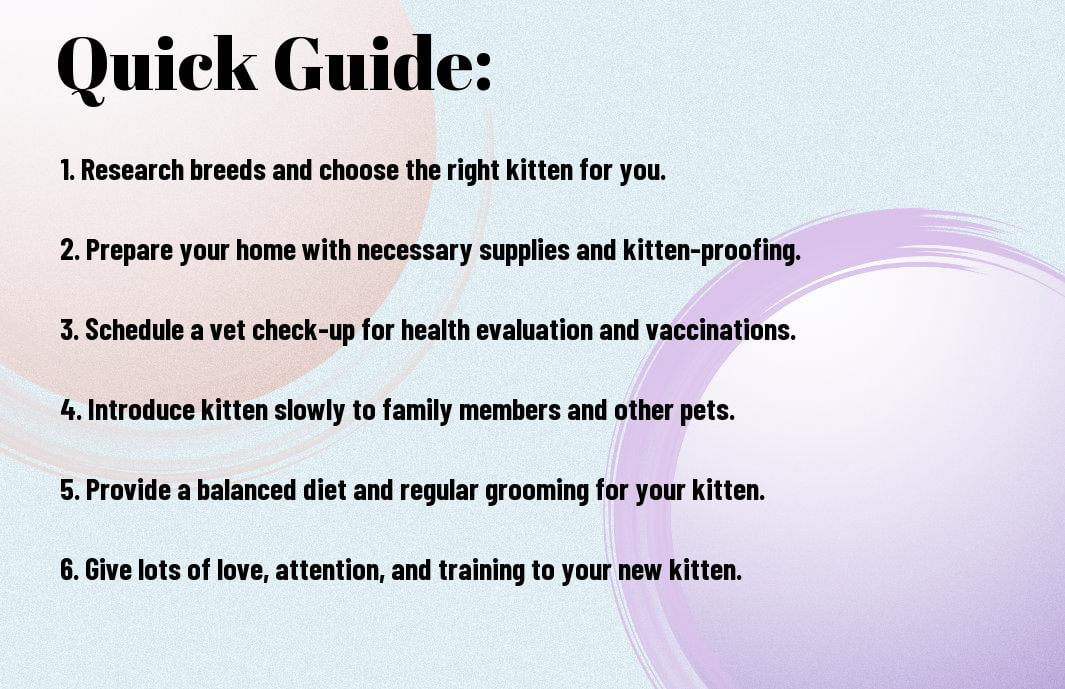Overwhelmed with the idea of welcoming a new furry friend into your home? Fear not, as this ultimate guide is here to help you navigate the exciting journey of adopting a kitten. Whether you are a first-time cat owner or looking to expand your feline family, we’ve got you covered with everything you need to know before, during, and after bringing home your new companion.

Exploring Types of Kittens
Any individual looking to adopt a kitten will find that there are various types of kittens to choose from. Understanding different cat breeds and their characteristics can help potential adopters find the perfect feline companion that matches their lifestyle, preferences, and personality.
Different Cat Breeds and Their Characteristics
If you are considering adopting a kitten, it is imperative to familiarize yourself with the various cat breeds and their unique traits. Some breeds are known for being more affectionate and social, while others may be more independent and reserved. Factors such as energy levels, grooming requirements, and temperament should all be taken into consideration when selecting a breed that suits your lifestyle. After all, each breed has its distinct characteristics that make them special companions.
| Breed | Characteristics |
| Siamese | Affectionate, vocal, and social |
| Maine Coon | Large, friendly, and playful |
| Persian | Long-haired, calm, and sweet-natured |
| Bengal | Active, curious, and intelligent |
| Ragdoll | Gentle, relaxed, and affectionate |
Understanding Kitten Personality Types
If you want to truly understand your kitten’s behavior, it is crucial to familiarize yourself with different personality types that kittens may exhibit. By recognizing traits such as playfulness, friendliness, or independence, you can better cater to their needs and provide a nurturing environment. The more you understand your kitten’s personality, the stronger bond you can develop with your new feline friend.
| Personality Type | Description |
| Playful | Always ready for a game, energetic, and curious |
| Cuddly | Loves to snuggle, affectionate, and social |
| Independent | Enjoys alone time, self-sufficient, and observant |
| Adventurous | Thrives on exploration, fearless, and lively |
| Social | Enjoys company, friendly, and communicative |
Any potential kitten adopter should take the time to learn about different breeds and personality types to make an informed decision. Understanding the characteristics and behavior traits of kittens can lead to a fulfilling and harmonious relationship between you and your new furry companion.
- The more you know about your kitten, the better equipped you’ll be to provide a loving and suitable environment.
- Note, every kitten is unique, so it’s imperative to tailor your care and attention according to their individual needs.
- Investing time in understanding your kitten’s breed and personality can result in a lifelong bond filled with love and companionship.
Factors to Consider Before Adoption
You have decided to welcome a new kitten into your home, but before making this life-changing decision, there are several factors to consider.
Lifestyle Considerations
- If you have a hectic work schedule and are rarely home, a high-energy kitten may not be the best fit for you. Consider adopting an older cat who is more independent and doesn’t require as much attention.
- Think about your living space as well. If you reside in a small apartment with limited space, a kitten that requires a lot of room to roam may not be the ideal choice.
The happiness and well-being of your future feline companion depend on how well their needs align with your lifestyle.
Financial Obligations
Clearly, owning a kitten comes with financial responsibilities. From initial adoption fees to ongoing vet visits, food, toys, and other crucials, the costs can add up quickly. It’s crucial to have a budget in place to ensure you can provide the necessary care and support for your new furry friend.
Adoption fees typically cover vaccinations, spaying/neutering, and microchipping. However, you should also consider the cost of annual vaccinations, flea and tick prevention, regular check-ups, and unforeseen medical expenses that may arise.
Preparing Your Home for a Kitten
Essential Supplies and Setup
You have made the wonderful decision to bring a kitten into your home. To ensure a smooth transition for your new feline friend, it is necessary to have the right supplies and setup in place. Some necessary supplies include a litter box, premium kitten food, food and water bowls, a comfortable bed, scratching post, toys, and a carrier for trips to the vet. Setting up a designated area for your kitten with these supplies will help them feel safe and secure in their new environment.
Creating a Safe and Welcoming Environment
Essential to preparing your home for a new kitten is creating a safe and welcoming environment. To achieve this, consider setting up a cozy space away from loud noises and high traffic areas. Make sure there are no small objects that could be swallowed, toxic plants, or hazardous items within reach. It’s also important to kitten-proof electrical cords and secure windows and balconies to prevent any potential accidents. Providing a safe environment will help your kitten settle in and adjust comfortably to their new home.
Creating a safe and welcoming environment for your new kitten involves more than just physical aspects. You should also consider their emotional well-being. Spend quality time with your kitten, providing love and attention to help them build trust with you and feel secure in their new surroundings. By creating a nurturing environment, you will set the foundation for a strong bond with your new furry companion.

The Adoption Process: A Step-by-Step Guide
Many soon-to-be cat parents find the adoption process to be an exciting and rewarding experience. Bringing a new kitten into your home is a big decision that requires careful consideration and planning. To help you navigate the adoption process smoothly, we have put together this step-by-step guide that covers everything from choosing the right shelter or breeder to screening and interacting with potential kittens.
| Choosing the Right Shelter or Breeder | Screening and Interacting with Potential Kittens |
Choosing the Right Shelter or Breeder
Adoption starts with selecting the right shelter or breeder to find your new feline companion. Shelters are often filled with kittens and cats of all ages in need of loving homes. They provide a great opportunity to give a rescue animal a second chance at a happy life. On the other hand, reputable breeders can be a good option if you are looking for a specific breed or want to know more about the kitten’s background and lineage.
Screening and Interacting with Potential Kittens
To ensure a successful adoption, it’s crucial to screen and interact with potential kittens before making your final decision. Spend time observing how the kittens interact with each other and with humans. Look for signs of good health, such as clear eyes and a shiny coat. Additionally, pay attention to their temperament and see if their energy level and personality match what you are looking for in a pet.
To make the most of your interaction with potential kittens, try to handle them gently and play with them to gauge their level of comfort and friendliness. Don’t be afraid to ask the shelter staff or breeder any questions you may have about the kittens’ history, health, and behavior. This will help you make an informed decision and ensure a smooth transition for both you and your new furry friend.

Tips for the First Days with Your Kitten
After a successful adoption and bringing your new furry friend home, it’s time to focus on acclimating your kitten to their new environment. The first few days with your kitten are crucial for building a strong bond and ensuring they feel comfortable and safe in their new home. Here are some tips to help you navigate this exciting time with your new companion:
Introducing Your Kitten to Their New Home
While it’s natural for your kitten to feel a bit overwhelmed in a new environment, there are steps you can take to ease their transition. Start by designating a quiet and secure room where your kitten can adjust to their surroundings gradually. Make sure the room has all the vitals like food, water, a litter box, and a comfy bed. Spend time with your kitten in this safe space, allowing them to explore at their own pace.
After a few days of settling in, you can slowly introduce your kitten to the rest of your home. Supervise their exploration to ensure their safety and comfort. Offer plenty of positive reinforcement and gentle encouragement as they navigate their new surroundings.
Establishing a Feeding and Care Routine
With your kitten settling into their new home, it’s important to establish a feeding and care routine to keep them healthy and happy. Start by providing a well-balanced kitten food that meets their dietary needs. Feed them at regular intervals to maintain a consistent schedule. Additionally, make sure to provide fresh water at all times to keep your kitten hydrated.
Home: Consistency is key when it comes to caring for your kitten. Set a routine for grooming, playtime, and litter box maintenance to create a sense of security and stability for your new feline companion. By establishing a routine early on, you’ll help your kitten feel at ease and ensure they thrive in their new home.
Long-Term Care and Maintenance
Now, let’s research into the crucial aspects of long-term care and maintenance for your furry feline companion. From health care tips to behavioral training, your kitten’s well-being and happiness depend on the care you provide.
Health Care Tips: Vet Visits and Vaccinations
On your journey as a responsible kitten owner, regular vet visits and vaccinations are non-negotiable. Schedule routine check-ups to ensure your kitten’s health and catch any potential issues early. Vaccinations are crucial in protecting your kitten from common diseases that could be harmful to their well-being.
- Make sure to follow the recommended vaccination schedule provided by your vet.
- Keep a record of all vaccinations and vet visits for future reference.
Knowing when your kitten is due for their next check-up or vaccination is vital in maintaining their health and preventing any unnecessary illnesses.
Behavioral Training and Socialization
On the subject of behavioral training and socialization, it’s crucial to start early to shape your kitten’s behavior and ensure they grow into a well-adjusted adult cat. Socialization with humans and other pets is crucial in preventing behavioral issues later on.
This early training also helps your kitten learn boundaries, such as where they are allowed to scratch and play. Positive reinforcement is key in encouraging good behavior and discouraging any undesirable habits. Consistency is key in training your kitten, so be patient and persistent in your efforts.
Pros and Cons of Kitten Adoption
| Pros | Cons |
| Unconditional love and companionship | Requires time and commitment for care |
| Opportunity to watch your kitten grow and develop | Initial costs for vaccinations, spaying/neutering, and supplies |
| Chance to save a life and give a kitten a forever home | Potential for allergies or behavioral challenges |
| Stress relief and mental health benefits | Responsibility for long-term care and well-being |
The Joys and Challenges of Raising a Kitten
Clearly, raising a kitten can bring immense joy and fulfillment to your life. The playful antics, cuddles, and purrs can brighten even the gloomiest of days. However, it’s important to acknowledge the challenges that come with kitten ownership. From the initial training to dealing with potential health issues, raising a kitten requires patience, time, and dedication.
While every moment with your furry friend is precious, it’s imperative to be prepared for the responsibilities that come with raising a kitten. From providing proper nutrition to ensuring they get enough exercise and veterinary care, being a kitten parent is a commitment that should not be taken lightly.
Realistic Expectations for First-Time Pet Owners
With the joy of bringing a new kitten into your home also comes the reality of being a first-time pet owner. It’s important to understand that raising a kitten involves more than just providing food and shelter. You will need to be prepared for behavioral issues, grooming needs, and potential health concerns that may arise.
It’s crucial to educate yourself on the basics of kitten care, seek advice from veterinarians or experienced pet owners, and be ready to invest time and effort into building a strong bond with your new feline companion.
Final Words
Drawing together all the vital information, tips, and guidance, “The Ultimate Guide To Adopting A Kitten” equips potential cat parents with the knowledge needed to provide love, care, and a fulfilling life for their new feline companion. By understanding the adoption process, preparing your home, and meeting the needs of a growing kitten, you can build a strong and lasting bond with your new family member.
Be mindful of, each kitten is unique, and it may take time for them to adjust to their new surroundings. Be patient, empathetic, and attentive to their needs, and you will create a harmonious and loving environment for your kitten to thrive in. With the right approach and dedication, the journey of adopting a kitten will be rewarding and enriching for both you and your furry friend.
FAQ
Q: Why should I adopt a kitten?
A: Adopting a kitten not only saves a life but also provides you with a loving and loyal companion. Kittens bring joy, laughter, and endless entertainment to your home.
Q: What should I consider before adopting a kitten?
A: Before adopting a kitten, consider factors such as your lifestyle, living situation, budget for pet care, and the time and commitment required to raise a kitten.
Q: How do I prepare my home for a new kitten?
A: Prepare your home by kitten-proofing it, setting up a cozy bed, providing food and water dishes, litter box, scratching posts, toys, and arranging a visit to the vet for vaccinations and a health check-up.
Q: What should I feed my kitten?
A: Feed your kitten high-quality kitten food that is specially formulated to meet their nutritional needs. Avoid feeding them human food, as it may be harmful to their health.
Q: How can I help my kitten adjust to their new home?
A: Help your kitten adjust by providing them with a safe space, plenty of love and attention, a consistent routine, gentle socialization, and gradual introductions to other pets in the household.

















